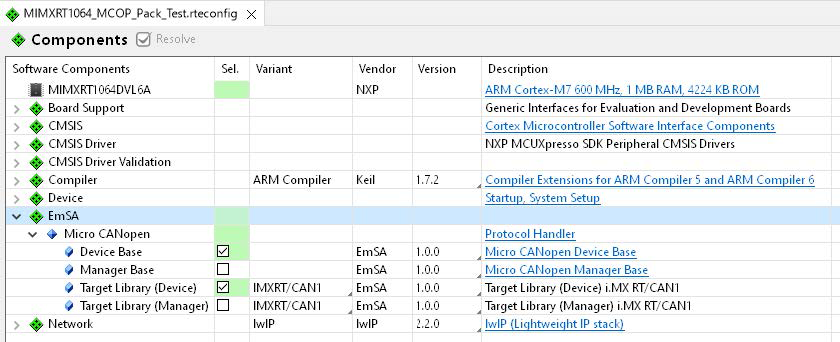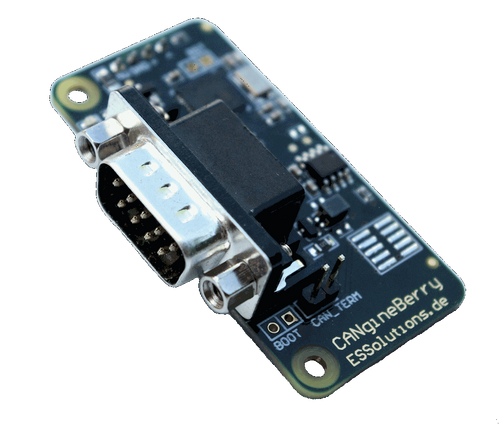Blog
Recent Posts
Micro CANopen Libraries for Embedded CANopen and CANopen FD
Posted by on
Embedded Systems Academy (EmSA) announced the release of its Micro CANopen libraries as Open-CMSIS-Pack compliant with the Common Microcontroller Software Interface Standard (CMSIS) by ARM.
The release simplifies CANopen implementation in embedded systems. Previously, the Micro CANopen libraries were part of selected NXP MCUXpresso software development kits (SDKs). Along with NXP's recent support release for MS Visual Studio Code, SDKs, and third-party components, the libraries are moving to Open-CMSIS-Packs, securing compatibility with a broader range of development tools and micro-controllers.
The Micro CANopen libraries offer a minimalistic implementation of the CANopen and CANopen FD higher-layer protocols for I/O devices and primary managers/controllers, and they come with no license charge. They are sufficient to implement basic I/O devices with limited parameters or controllers with limited network connections. The libraries are compatible with the latest ARM CMSIS releases. Developers can use any tool supporting Open-CMSIS-Packs to access the CANopen libraries, such as NXP MCUXpresso, Visual Studio Code, Arm Keil MDK, and IAR Embedded Workbench. The initial micro-controller support covers several NXP LPC and i.MX micro-controller derivatives.
EmSA provides embedded software solutions and specializes in CAN (Controller Area Network) and CANopen. The software products, consulting services, and training courses support developers in designing embedded systems for automotive, industrial automation, medical applications, and more.
CANgineBerry - CANopen Module for Raspberry Pi
The CANgineBerry for CANopen is an active CAN Bus co-processor module that uses a regular UART communication channel towards the host system. With its independent 32-bit microcontroller, the CANgineBerry can easily execute CAN Bus protocols with tough timing demands such as CANcrypt or CANopen with response times of under 10 ms. Depending on the configuration, the CAN Bus communication can be up and running within 50 ms after power-on, even if the host system takes significantly longer to boot.
MCUXpresso Software Development Kit (SDK) Incorporates A Free Version Of Micro CANopen FD Library
The latest release of the MCUXpresso software development kit (SDK) from NXP incorporates a free version of the EmSA's (Embedded Systems Academy) Micro CANopen FD library.The MCUXpresso IDE provides embedded development engineers an easy-to-use Eclipse-based development environment for NXP MCUs based on ARM Cortex-M cores, including its general-purpose crossover and Bluetooth-enabled MCUs. The MCUXpresso IDE comes [...]
LPC1768/1769 - ARM Cortex M3 Development - The "Hello World!" Application
This post is a follow-up on my article LPC1768/1769 - ARM Cortex M3 Development - MCUXpresso IDE Installation And Adding A Template Project, in which we installed the MCUXpresso integrated development environment (IDE) and created a working but non-functional project for the LPC1768/LPC7169 processor. You can start the compilation (click on "Build 'LPC1769Template' [Debug]"), and there will [...]
LPC1768/1769 - ARM Cortex M3 Development - MCUXpresso IDE Installation And Adding A Template Project
After getting your LPC1768 or LPC1769 Cortex-M3 Development Board, it is time to getting started with MCUXpresso IDE. In this Step by Step tutorial we will go through the process of creating projects in MCUXpresso IDE for Cortex-M series Microcontrollers by NXP(Founded by Philips) based on CMSIS (Cortex Microcontroller Software Interface Standard). MCUXpresso is a derivative [...]
Professional ARM Cortex M3 Development System With Eclipse-Based IDE Starting At 85 Dollars
There are two worlds when it comes to the programming of embedded applications, one for hobbyists and engineers involved in rapid prototyping and one for "professional" programmers. The first one is represented by hardware platforms such as the Arduino, Raspberry Pi, BeagleBone, and others. The second is dominated by non-standard and thus expensive hardware systems [...]
The MCUXpresso Integrated Development Environment (IDE)
This page is part of a series of posts by Wilfried Voss titled NXP LPC17xx ARM Cortex-M3 Microcontroller - Programming Tips & Tricks, explaining the programming of embedded systems using the ARM Cortex-M3 processor. The MCUXpresso IDE brings developers an easy-to-use Eclipse-based development environment for NXP MCUs based on ARM® Cortex®-M cores, including, among many others, the LPC [...]
 Loading... Please wait...
Loading... Please wait...


